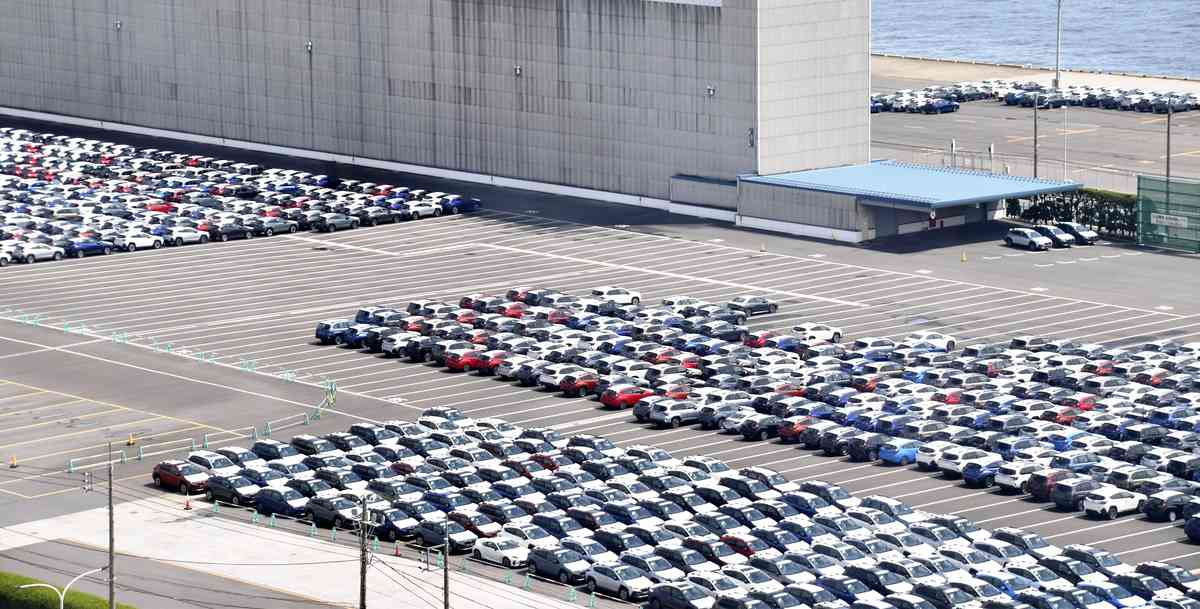Japanese Companies, Farmers Fear Heavy Impact of Trump’s New Tariffs; Automakers Brace for 20% Hit to Profits

Cars are seen lined up at a port in Kawasaki on March 28.
14:54 JST, April 4, 2025
The combination of additional automobile tariffs and the reciprocal tariffs imposed by the administration of U.S. President Donald Trump may inflict a serious blow to Japanese industries, according to experts.
During the first Trump administration, additional tariffs were imposed to a limited number of items, such as steel and aluminum products. However, the new reciprocal tariffs cover almost all products exported to the United States. Japanese companies are scrambling to discuss measures against the tariffs, but handling the situation will not be easy as reviewing production systems is not a simple task.
Ken Kobayashi, chairman of the Japan Chamber of Commerce and Industry, expressed strong concerns over the additional 25% tariffs imposed on automobiles in a comment issued Thursday. “The automobile industry is underpinned by wide reaching supply chains. I am concerned that (the additional tariffs) will have an enormous impact on the Japanese economy as a whole through decreases in orders, investment and employment,” he said. The U.S. automobile market is the second largest in the world, with sales of about 16 million units in 2024. Automakers export about 1.3 million units from Japan, and they also ship to the United States from Mexico and Canada.
Mizuho Research & Technologies Ltd. estimates that the new U.S. tariffs will diminish the operating profits of Japanese automakers by about 20%. The six major Japanese automakers operating in the United States posted a combined consolidated operating profit of 8.2 trillion yen in the fiscal year which ended in March 2024. A simple calculation suggests 1.6 trillion yen could be lost as a result of the tariffs.
Automakers are considering how they will deal with the new tariffs. Toyota Motor Corp. plans to absorb the cost increases for the time being and keep the prices of its vehicles in the United States unchanged. On the other hand, Mazda Motor Corp. President Masahiro Moro said in March, “If it were possible to decrease costs (to offset the tariffs), I would have done so already.”
The head of another automaker said: “It is impossible to absorb the 25% tariff. No company can avoid raising prices.”
Some foreign automakers have already indicated their intention to raise prices, so it is possible that Japanese manufacturers will follow suit.
Increasing production at factories in the United States is one option for avoiding the tariffs. However, it will be difficult to make up the loss on exports just by increasing production at existing facilities. It takes years to build new plants, and the money required for such investments will be huge.
The automobile industry employs 5.5 million people in Japan, which also includes such firms as parts companies, so there are concerns that the tariffs will have impact on related industries. “Major automakers may become even more demanding regarding cost reductions,” a senior official of a parts manufacturer said.Agriculture, food may also be hit Details of the reciprocal tariffs were announced on Wednesday. The tariffs cover a wide range of items, including construction machinery and agricultural, forestry and fishery products, with exemptions placed on such items as pharmaceutical products and semiconductors.
Major heavy machinery maker Komatsu Ltd. has sales of about 3.6 trillion yen in its construction and mining vehicles, with about 30% of them produced in North America. The company ships its products to the United States from countries including Japan, China and Canada. The company said it is currently researching the possible impact of the tariffs, but it seems inevitable that the tariffs will impose a blow on its business performance.
Yamaha Motor Co. exports outboard motors and parts to the United States from Japan. According to the company, the impact of the tariffs on its operating profit is estimated to be a few tens of billions yen.
“It will be impossible to completely absorb the cost of the tariffs (by ourselves). The impact will be enormous,” Yamaha Motor President Motofumi Shitara told reporters on Thursday. “Some of the impact will have to be mitigated by raising prices or changing suppliers.”
The Japanese government has been working to expand exports of agricultural, forestry and fishery products and food, but the additional tariffs will likely be a headwind for such efforts.
Because of such reasons as the growing popularity of Japanese food, exports of agricultural, forestry and fishery products and food posted record highs for 12 straight years, reaching 1.5 trillion yen in 2024. The influence of the United States is significant, as the country ranks as the top destination for Japanese exports by country or region, at 17.2% by value. The Japanese government plans to increase exports of agricultural, forestry and fishery products and food to 5 trillion yen in 2030, but the target will be difficult to achieve if exports to the United States slow down.
“Even if (farmers) make efforts to reduce production costs, if tariffs are raised, the competitiveness of (their) products will decline,” said a spokesperson of the Japan Rice and Rice Industry Export Promotion Association.“The tariffs will impede our efforts on promoting the quality of Japanese rice and increasing its exports.”
Related Tags
Top Articles in Business
-

Prudential Life Insurance Plans to Fully Compensate for Damages Caused by Fraudulent Actions Without Waiting for Third-Party Committee Review
-

Narita Airport, Startup in Japan Demonstrate Machine to Compress Clothes for Tourists to Prevent People from Abandoning Suitcases
-

JR Tokai, Shizuoka Pref. Agree on Water Resources for Maglev Train Construction
-

Toyota Motor Group Firm to Sell Clean Energy Greenhouses for Strawberries
-

KDDI Opens AI Data Center at Former Sharp Plant in Osaka Prefecture; Facility Will Provide Google’s Gemini AI Model for Domestic Users
JN ACCESS RANKING
-

Japan PM Takaichi’s Cabinet Resigns en Masse
-

Japan Institute to Use Domestic Commercial Optical Lattice Clock to Set Japan Standard Time
-

Israeli Ambassador to Japan Speaks about Japan’s Role in the Reconstruction of Gaza
-

Man Infected with Measles Reportedly Dined at Restaurant in Tokyo Station
-

Man Infected with Measles May Have Come in Contact with Many People in Tokyo, Went to Store, Restaurant Around When Symptoms Emerged




















